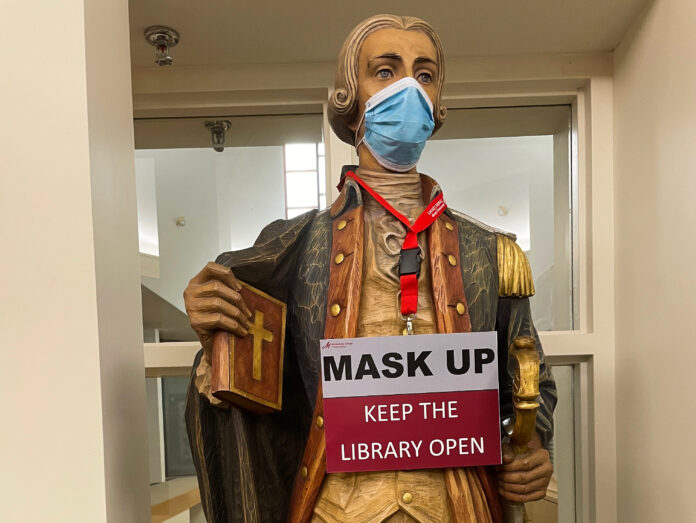The switch back to in-person learning at Muhlenberg has required rearranging — not just reverting to the way things were. The protocols campus saw last semester: surveillance testing, symptom trackers and residence hall visitor policies are drastically different. Surveillance testing is no longer occurring, symptom trackers have been phased out, and the visitor policy only applies to off-campus visitors. The COVID-19 vaccination requirement enabled these changes, and made students more comfortable.
Although there is a high rate of vaccination, that only represents students and staff. “The currently reported number, 96 percent vaccinated, would be great if we were in a giant glass globe where no one entered or exited. It minimizes our risk as long as we only interact with each other,” says Chrysan Cronin, Ph.D, director and associate professor of public health. However, the wider Muhlenberg community exists outside of the bubble between 22nd and Chew.
Campus currently faces the “Muhlen-plague,” the seasonal cold that students don’t want to catch yet inevitably still spreads. The cacophony of coughing heard in all classes demonstrates that many students are getting sick. Larissa Davidowitz ’23 observed that for “breakthrough cases, people are not having symptoms like loss of taste or smell. If anything, it’s slight flu-like symptoms like body aches, sore throats and feels like it’s allergies…Now along with this ‘Muhlen-plague’ thing, [people] will just say, ‘oh it’s the Muhlen-plague I don’t need to get tested.’ You could just say you’re sick with Muhlen-plague, you don’t have to say COVID.” Davidowitz urges testing, not just for symptomatic students. Without surveillance testing, COVID-19 could be running rampant without anyone’s knowledge. According to the reported numbers on the COVID-19 dashboard, there are already six student cases and three faculty cases.
The currently reported number, 96 percent vaccinated, would be great if we were in a giant glass globe where no one entered or exited. It minimizes our risk as long as we only interact with each other…
Chrysan Cronin, Ph.D
The COVID dashboard located on Muhlenberg’s website is the control center for all case updates. While it is meant to communicate these numbers with the Muhlenberg community, they only represent a small population. Dr. Cronin explains, “the current strategy that the College is using also depends on people self-reporting symptoms, which some people are reluctant to do.
“This practice does not allow for a proper assessment of the level of risk each of us is at… We are ‘selection’ biasing our results, further limiting the usefulness of those numbers, which leads to underestimation of the positives.”
Students who feel sick and can’t attend classes can arrange with their professors different ways to make up work. One digital accommodation is to set up Zoom meetings for students to join, but many worry about the fatigue of laying in bed during a lecture with the camera turned off. Some professors have expressed unwillingness to stream classes on Zoom, and have even gone as far to float the idea of students taking a temporary medical leave if they test positive.
This strategy is not necessarily used for “flipped classrooms” like Assistant Professor of Public Health Kathleen Bachynski’s, Ph.D., epidemiology class this semester. “My current flipped classroom approach is where I have my lectures prerecorded and in-person is more like practice problems and conversation. That way if you can’t be there in person, you can watch the lectures on your own time and rewind or take notes.”
Dean of Academic Life Michele Deegan stresses that “students need to remember that it’s usually okay to miss a class or two and any time they are missing class, to talk with their instructors, as we all have different absentee policies and practices for making up work. We want you to come to class, to engage with us, and with one another, in person.”
“students need to remember that it’s usually okay to miss a class or two and any time they are missing class, to talk with their instructors, as we all have different absentee policies and practices for making up work.”
Michele Deegan, Dean of Academic Life.
The Office of Disability Service also provides plans for students who need the option to take a leave of absence from classes for up to three weeks, as well as a completely remote option this semester.
Students missing class may be visiting Muhlenberg’s health center. However, limited hours and an unprecedented demand for appointments has left the Health Center struggling to keep up. Grace Nyberg ’23 is one student feeling these effects. . “I know everyone right now is sick, but I was always sick my freshman year and even then it was so difficult.” Some changes may be seen soon, such as the addition of telehealth appointments, referrals to local urgent cares with healthcare professionals and a third-party company for rapid testing.
In a recent update, Academic Dean Allison Williams addressed the health center concerns: “Some of our patient load is driven by normal health issues prevalent in college communities. This is currently compounded by all of us experiencing a reawakening of our immune systems after significant time in isolated settings.”
Many students are already going off-campus and visiting local urgent cares, specifically to get tested. These off-campus urgent care test results do not get reported to the school, thus removing more students from the testing population, and the inaccuracy of the COVID dashboard numbers continue.
Alex Caban-Echevarria ’23 is double majoring in media & communication and English. She is the Assistant Editor of the Allentown Voice, a non-profit student journalism lab and a Pro Publica Emerging Reporter for the 2022-2023 academic year.






















